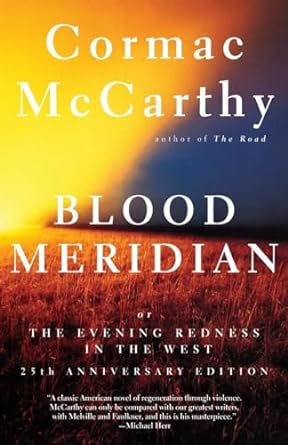Murder Without a Cause
Book Review: Blood Meridian by Cormac McCarthy
“It makes no difference what men think of war, said the judge. War endures. As well ask men what they think of stone. War was always here. Before man was, war waited for him. The ultimate trade awaiting its ultimate practitioner. That is the way it was and will be. That way and not some other way.”
― Cormac McCarthy, Blood Meridian
Genre: Historical fiction, Western
My rating: 2 out of 5 stars
If you’ve ever wondered what it would feel like to wander through a desolate, grimdark wasteland with absolutely no hope of escape, you’re in for a real treat. Cormac McCarthy manages to take the classic Western genre and wring every last drop of fun out of it, leaving you with a grim, relentless slog through dust, murder, incoherent philosophical musings and pretentiously worded prose.
The plot, which is basically a series of brutally violent acts, follows a character only referred to as "The Kid," a boy with all the personality of a tumbleweed. He joins a group of scalp hunters led by Judge Holden, a villain who’s equal parts terrifying and completely incomprehensible. The Judge spouts cryptic monologues that are supposed to be profound but often feel like the ramblings of a philosophy major who just discovered Nietzsche after a half dozen tequila shots.
The Judge, who is an enormous bald albino, seems to be the embodiment of evil itself—so naturally, McCarthy has him prancing around naked like a surreal nightmare that won’t end. This might be the only humor in the book, but it’s the kind that makes you question your sanity rather than laugh. The Judge is by far the most interesting of the bunch. He says things like:
“The way of the world is to bloom and to flower and die but in the affairs of men there is no waning and the noon of his expression signals the onset of night. His spirit is exhausted at the peak of its achievement. His meridian is at once his darkening and the evening of his day.”
Was that fun to read for you? Me neither. This book is full of passages like this—unnecessarily pretentious. The dialogue is sparse—McCarthy is allergic to quotation marks, apparently—and the prose swings between bleakly poetic and utterly impenetrable. I swear there are whole paragraphs where I lost track of what was happening because McCarthy decided to describe a sunset using words that may or may not even exist in the English language anymore.
Let’s talk about the gratuitous violence for a sec. This book is chock full of scalpings, shootings, stabbings, live babies bashed against rocks and hanging from trees, and every form of human brutality imaginable with little to no emotional impact on the characters because they’re all sociopaths. It's like watching a highlight reel of every bad decision humanity has ever made and wondering, “Why am I still reading this?”
Ultimately, Blood Meridian feels like an elaborate endurance test for the marginally well-adjusted reader. If you finish it, you can’t help but feel a weird sense of accomplishment—like you’ve survived something traumatic. But is it enjoyable? Not really.
I had high expectations because I read The Road earlier this year and loved it. I loved the brevity of his prose in The Road, almost Hemingway-esque. Plus, The Road was a story of deep love and compassion. There is none of that in here. It’s almost like the concept of compassion or empathy doesn’t even exist in the Blood Meridian world. It was such an awful place for my mind to be.
In summary, if you’re in the mood for a cheerful Western romp, read Lonesome Dove. If you want to dive into the abyss of human depravity and question the very fabric of existence (and not in a fun way), Blood Meridian will gladly take you there—and leave you stranded with no water.
If you enjoyed this review, check these out!




Thank you. Somehow I missed this email, but I'm glad to find someone else who thought St. McCarthy's bleak slog was too grim to call "great." 🫡